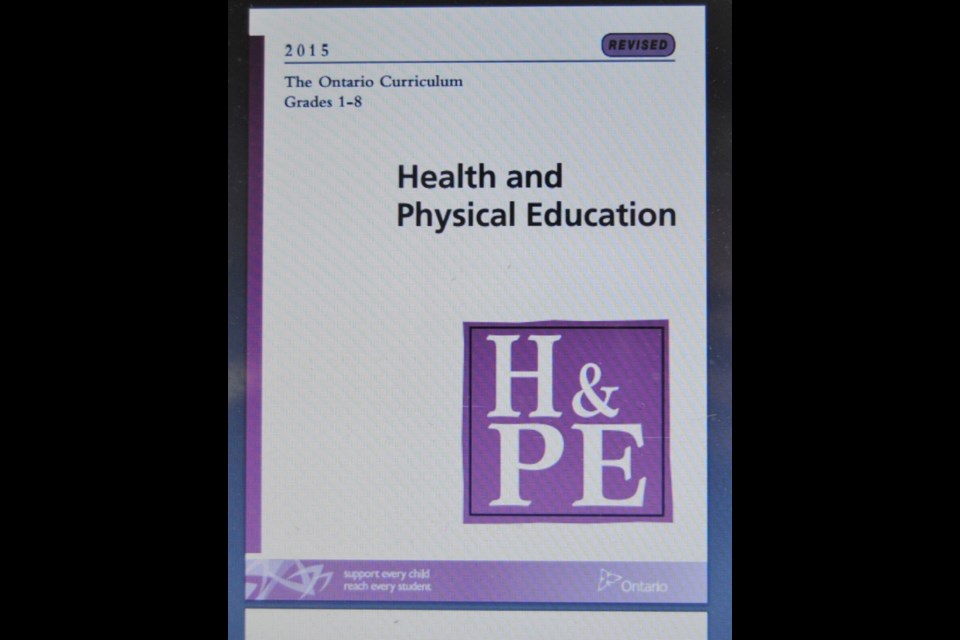School board trustees concerned that parents opposed to the teaching of Ontario’s new sex education curriculum may be keeping children home on days controversial aspects were taught, discussed ways of measuring attendance for the health classes
Trustees also wanted to accurately measure how elementary school students were responding to the health education classes based on the controversial changes made by the Ministry of Education last September.
For access to the Ministry of Education’s revised curriculum on physical and health education for grades 1 to 8 click here.
School Board Trustee Dennis Draves (Cochrane) filed a list of a dozen questions to board administrators wanting to know how well the classes were being attended by students.
Draves, a former principal, wanted to gauge how many students stayed away or were pulled out of class by their parents as a result of the new sex education curriculum
“The concern is that some parents may simply pull their children out of class to protest their displeasure with lessons for elementary school grades,” Draves told the meeting of school trustees.
Acting chair Bob Brush (Timmins) then instructed school superintendent Jo-Anne Plaunt, to respond to Trustee Draves written questions.
On the question of teacher training, Plaunt told school trustees that teachers teaching the new curriculum are doing so without training because sessions were cancelled during teacher’s work to rule campaign during contract negotiations last year.
School board representatives did go to Sudbury for training sessions but they could not in turn train DSBONE teachers because of the job action teachers were involved in.
However, training sessions will be held in April, Superintendent Plaunt told the trustees.
On the question of monitoring absenteeism, Plaunt said schools were not tracking student absenteeism.
She explained that it would be difficult to ascertain why a child is absent from a health class unless parents knew in advance that aspects of the new sex education curriculum were going to be taught.
“It will have to be brought to our attention that the parents knew in advance that we were teaching the new sex ed material in order for us to measure its impact on attendance,” Plaunt explained. “Otherwise the child could be away because of illness like the flu.”
“If we gave the schedule to parents and then they informed us they were keeping their child away because of the sex education we would be in a better position to track attendance based on protest,” she added.
On the matter of who in the elementary grades teaches the sexual education curriculum, Plaunt said there are very few dedicated physical education teachers and that most of the classes would be taught by the home room teacher.
“If parents are interested in reviewing the new sex education curriculum it is available online and they can inform themselves on what is being taught,” Plaunt said.
“It’s important to tell parent’s what is being taught so they can continue the discussion at home,” she explained.
“As a former principal, I think we need to inform parents that the curriculum is available for their review and also to let them know when it is being taught,” Trustee Draves said
Draves said he wanted to know if someone is checking to see that teachers are actually teaching the new curriculum.
“It would be up to the principal of each school to check whether or not teachers were teaching the sex education material or skipping over it,” replied Plaunt.
Draves wanted to know if DSBONE schools used material developed by the Ontario Physical and Health Association (OPHEA), a not-for-profit organization that champions healthy, active living in schools and communities.
“All of our schools can access OPHEA material and it is always being updated,” replied Plaunt. “But I don’t think it is very good.”
“For example, one of the worksheets had a picture of a penis, a vagina and a bum and the children were asked to label them,“ she said.
The discussion then turned to the desirability of dropping the use of the term sexual education in favour of body science.
“B.C. has done that and they found that the amount of parental disagreement has been reduced when you use that terminology,” said Trustee Draves.



